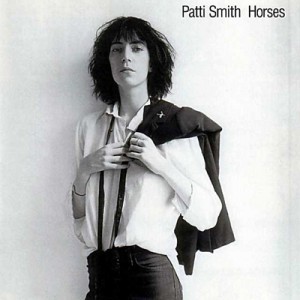
A Classic Of Classics, The Photograph Gracing The Cover Of "Horses" Was Taken By Robert Mapplethorpe At Greenwich Village.
Jesus died for somebody’s sins but not mine.
What an unrepentant way to start an album and to announce a whole career. Patti Smith’s debut came in 1975, and it was the first piece of vinyl whose surges bristled with the unsurpassed fire that was growing within the walls of the mythic CBGB, and which would gloriously run rife before a year had elapsed.
Patti (who was slightly older than members of most other acts associated with the famed venue) was certainly one of its most articulate participants, in no small part owing to her early explorations of different branches of visual and performance arts. She brought some of the most literate considerations to a scene that was also nurtured by the contributions of artists like Tom Verlaine (with whom she was briefly involved, and who actually added a typical all-or-nothing solo to the song “Break It Up”) and the Talking Heads (a band that I have never been that keen on – and I couldn’t love XTC more. Go figure.) And her actual romantic interest at the time “Horses” was released was photographer Robert Mapplethorpe, whom she had met at Pratt Institute (Brooklyn) and who would make a vital contribution to the album: its actual cover shot.
This androgynous photograph has deservedly gone down in the history of music as an absolute visual achievement. It captured the willingness of punks to transcend the blandness of conventional categorizations as much as the music included on the actual record, which Smith herself defined as “Three chord rock merged with the power of the word”.
You can’t call “Horses” a punk record, mind you. You can (and should) term it a record that set the scene for the arrival of a more vibrant and violent force of expression than what was available before.
In many places, “Horses” is an album that asserts the role of women in rock, what with male characters who are sodomized as in the first segment of “Land” and songs about female characters that defy conventionalisms such as “Kimberly” (a song which Patti wrote to deal with the lingering feelings of the baby she had to give for adoption when she was much younger).
You can’t call really call a record with songs like “Gloria” or “Birdland” a punk album. “Gloria” references the Them song by the same name, and it was a clear nod to fellow CBGB pioneers Blondie. And “Birdland” is a piece of jazz that might even mar the flow of the disc, but which was actually an important piece for Patti if only because it acted as a symbolization of her mother.
And the album also has an outright ballad in the shape of “Elegy”. It is a somber lyric that Richard Sohl’s piano leads into even darker territory, and one of the starkest explorations of loss that Smith would undertake in her whole career.
So, while “Horses” is not a punk record like “Never Mind The Bollocks” was, it deserves to be situated within the movement inasmuch it champions the radicalized outburst of creativeness and independent aesthetics that would define the best punk music that was to ever exist.
And in any case, the album included the potent “Free Money”, “Break It Up” and the passage opening up the three-part suite “Land” (where Patti also pays homage to Rimbaud, the doomed decadent French poet of the early 20th Century, and the one writer many consider the first “modern” poet ever).
I must admit that this is a record I have to be in the mood for. In a certain sense, it is like The Who’s “My Generation” – an album which stands as a true blueprint upon which more radicalized manifestations were to be based. Certainly, if you look at the actual resonance this has had and the musicians that it managed to guide not just by the hand but by the scruff of their necks (a list that includes artists as dissimilar as The Smiths and R.E.M.) it dawns on you that “Horses” must be one of the most dominant albums ever. As bizarre as it sounds, we have proof that one musician actually put everything else he had for sale upon getting a copy of “Horses” at the time it was first issued. He claimed it was everything he needed.
It is improbable to think anybody would do that in the year 2010 upon discovering its music. Too much has happened ever since, and many have murkied the waters in an attempt to make them look deeper. That won’t change overnight. But the person who buys “Horses” today will gain a victorious insight into the (sadly) final years in which music could form a bond with listeners that was pure, authentic and absolutely unapologetic. Many of us were too young to be there. That is a cause to be sad. But music like this stands as the most passionate snapshot we can get our hands on. And (as much as we lament not having been there then) that should never go unaccounted.
Rating: 8.5/10

Pingback: Patti Smith – General Introduction | MusicKO